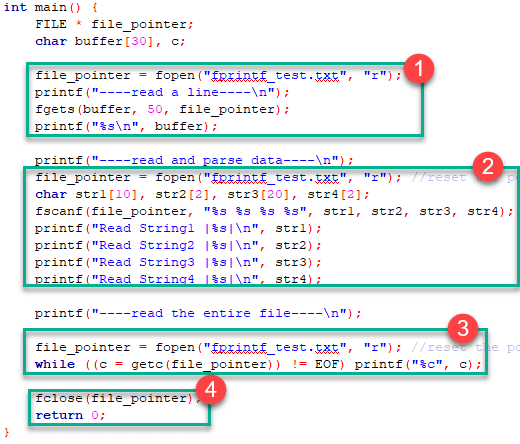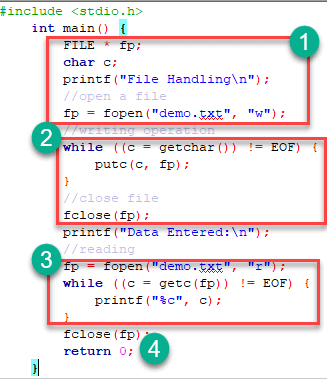FILES PART 2
Reading data from a File
There are three different functions dedicated to reading data from a file
- fgetc(file_pointer): It returns the next character from the file pointed to by the file pointer. When the end of the file has been reached, the EOF is sent back.
- fgets(buffer, n, file_pointer): It reads n-1 characters from the file and stores the string in a buffer in which the NULL character '\0' is appended as the last character.
- fscanf(file_pointer, conversion_specifiers, variable_adresses): It is used to parse and analyze data. It reads characters from the file and assigns the input to a list of variable pointers variable_adresses using conversion specifiers. Keep in mind that as with scanf, fscanf stops reading a string when space or newline is encountered.
The following program demonstrates reading from fputs_test.txt file using fgets(),fscanf() and fgetc () functions respectively :
#include <stdio.h>
int main() {
FILE * file_pointer;
char buffer[30], c;
file_pointer = fopen("fprintf_test.txt", "r");
printf("----read a line----\n");
fgets(buffer, 50, file_pointer);
printf("%s\n", buffer);
printf("----read and parse data----\n");
file_pointer = fopen("fprintf_test.txt", "r"); //reset the pointer
char str1[10], str2[2], str3[20], str4[2];
fscanf(file_pointer, "%s %s %s %s", str1, str2, str3, str4);
printf("Read String1 |%s|\n", str1);
printf("Read String2 |%s|\n", str2);
printf("Read String3 |%s|\n", str3);
printf("Read String4 |%s|\n", str4);
printf("----read the entire file----\n");
file_pointer = fopen("fprintf_test.txt", "r"); //reset the pointer
while ((c = getc(file_pointer)) != EOF) printf("%c", c);
fclose(file_pointer);
return 0;
}Result:
----read a line---- Learning C with Guru99 ----read and parse data---- Read String1 |Learning| Read String2 |C| Read String3 |with| Read String4 |Guru99| ----read the entire file---- Learning C with Guru99
- In the above program, we have opened the file called "fprintf_test.txt" which was previously written using fprintf() function, and it contains "Learning C with Guru99" string. We read it using the fgets() function which reads line by line where the buffer size must be enough to handle the entire line.
- We reopen the file to reset the pointer file to point at the beginning of the file. Create various strings variables to handle each word separately. Print the variables to see their contents. The fscanf() is mainly used to extract and parse data from a file.
- Reopen the file to reset the pointer file to point at the beginning of the file. Read data and print it from the file character by character using getc() function until the EOF statement is encountered
- After performing a reading operation file using different variants, we again closed the file using the fclose function.
Interactive File Read and Write with getc and putc
These are the simplest file operations. Getc stands for get character, and putc stands for put character. These two functions are used to handle only a single character at a time.
Following program demonstrates the file handling functions in 'C' programming:
#include <stdio.h>
int main() {
FILE * fp;
char c;
printf("File Handling\n");
//open a file
fp = fopen("demo.txt", "w");
//writing operation
while ((c = getchar()) != EOF) {
putc(c, fp);
}
//close file
fclose(fp);
printf("Data Entered:\n");
//reading
fp = fopen("demo.txt", "r");
while ((c = getc(fp)) != EOF) {
printf("%c", c);
}
fclose(fp);
return 0;
}
Output:
- In the above program we have created and opened a file called demo in a write mode.
- After a write operation is performed, then the file is closed using the fclose function.
- We have again opened a file which now contains data in a reading mode. A while loop will execute until the eof is found. Once the end of file is found the operation will be terminated and data will be displayed using printf function.
- After performing a reading operation file is again closed using the fclose function.



Comments
Post a Comment